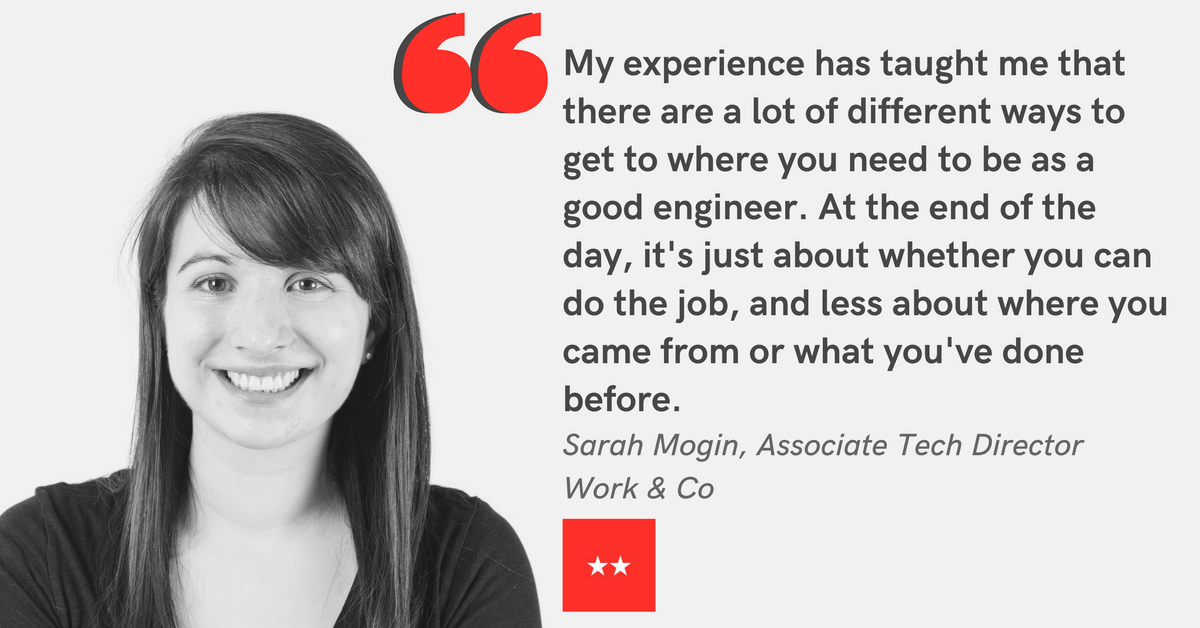Sarah Mogin never used to like writing open-ended essays in school. She found herself much more motivated by tangible problems.
Calculus had some of those—she never had trouble with her math homework—but when she was in school she never envisioned just how much she could incorporate that love of solution-finding into her daily work, much less that she would have a career as a developer one day.
"I've always gotten a lot of motivation out of solving complex problems of any sort," says Sarah.
After college, Sarah made a big move to New York and found herself in a job working at a digital marketing agency. From there she began to gain a better sense of the pathways to new opportunities that existed in the digital space and took the steps she needed to make a significant life switch.
Now, as an Associate Tech Director at design and development company Work & Co, she's able to work on a diverse set of projects and apply a creative lens that makes use of all of her past-life knowledge.
We sat down with Sarah to hear more about her career switch and what advice she has for other people with non-tech experience who are looking for ways to make the most of all they know.
Taking risks to capitalize on opportunities
When Sarah first moved to New York, she got into digital marketing via a $10-an-hour Craigslist ad. With plenty of opportunities to learn practical skills like search engine optimization, social media marketing, and writing online press releases, she came up the curve quickly.
"I wasn't super passionate about those things, but I appreciated having a job and concrete tasks, so I dove in," she says. After a few more years there, she had started a PR department, written training documents and marketing materials, and hosted webinars and seminars.
"It was just kind of a time in my life where I kept saying yes to things and experimenting. It was a way to keep learning," says Sarah, who realized that she wanted to continue her learning in more formal ways, too, like going back to school.
Having spent some time honing her skills in communication and social media, she realized she wanted to tap more deeply into other aspects of the digital space. She had long had an interest in web development and programming. "I didn't have a class on it in high school. I didn't know anyone whose parents were programmers," she says. "I had some hesitancy about making the change, but I wanted to have a skill and combine what I could do naturally with someone teaching me an advanced skill or trade."
So she took a risk and left her job and enrolled in a 12-week coding bootcamp.
Dealing with imposter syndrome
The bootcamp ended up being a great decision, says Sarah, but that wasn't immediately apparent. Finding a new role coming out of her training was tough. She filled out 100 job applications and found that many companies didn't want to take a chance on someone with a non-traditional background. "They just didn't understand that I was this well-rounded person with a lot of skills already but now had added coding, and I was good at it," she says.
Eventually, Simon & Schuster bit, and Sarah got her first official role in tech, coding in Ruby on Rails (and enjoying free books that came with the job).
After she'd gained enough experience there and when it came time to leave that company and look for something new, though, Sarah was daunted by having to prove herself all over again.
She wanted to work somewhere that could meld strong creative and design foundations with technology, thinking a job like that would fit her interests and abilities well. When she heard about Work & Co, she knew it was the place for her—but wasn't sure if they would agree.
"I liked that there was a defined focus on products and experiences, that everything they built was intended to be an enduring product that people could use every day. To me, that was going to be fun to work on. But, in addition to being a tech outsider, I was also an agency outsider," she says. "I had only worked in-house."
Sarah ended up getting a job offer from Work & Co, which was open to her self-taught background. Without a ton of code samples under her belt yet, she started as a developer but quickly moved up with team members around her acknowledging that she was at a higher skill level than they initially thought.
She was able to take on a range of complex projects, in sectors ranging from education to nonprofit to retail and on products that span websites and CMS platforms to e-commerce and chatbots. It's been seven years since she made the switch and today Sarah is not only still a hands-on developer with a diverse toolkit, but she's also an award-winning technology leader and mentor to other employees.
5 tips for making a career switch work for you
Sarah kept—pleasantly—surprising her team. From being able to lead client projects (leaning on her digital marketing agency experience) to knowing how to hire new team members, she was able to lean into the skills she honed in her past roles and make an even bigger impact.
Here's the advice she has for other people looking to do the same thing:
- Recognize that as a career-switcher, you're bringing much-needed updated thinking. "Even when I was a new engineer and sometimes thought of myself as an imposter, coming from a bootcamp, I had a more up-to-date engineering background than some of the other developers," reflects Sarah.
- Be confident about what you bring to the table. Sarah says her past experience has allowed her to confidently volunteer for new roles and to share her opinion. "I have context from my prior life that can be helpful," she says. "It's good to have those skills in your back pocket in addition to what people are just expecting you to have as an engineer."
- But start with crushing your main job first. "It's easy to get excited about initiatives like helping to recruit or leading meetings or events. I really love doing those things, but you have to make sure you're doing your day-to-day responsibilities really well," says Sarah. "It's a lot easier for people to invest in you if they already see your success."
- Manage up by taking initiative. "Sometimes people have trouble relinquishing control or figuring out how you can help," says Sarah, who recommends just getting started. "Rather than proposing an idea to someone, you can show them something you've already put together. Instead of saying, 'I want to write a post on our company blog,' you can say, 'Here's an outline for a post.'"
- Pay it forward via recruiting. "I wanted to be involved [in hiring] right away because as someone who had just broken into the industry, I wanted to help people like me, or even people different from me, but who felt like outsiders for any other reason," says Sarah. "My experience has taught me that there are a lot of different ways to get to where you need to be as a good engineer. At the end of the day, it's just about whether you can do the job, and less about where you came from or what you've done before."
Interested in working at Work & Co? Check out their open roles!




